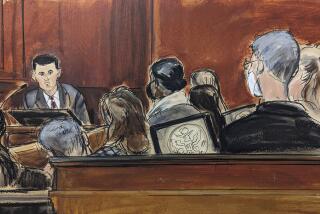NEWS ANALYSIS : Keating Trial Turns on Questions of Credibility : Courts: Testimony by witnesses on both sides in fraud case leaves plenty of room for doubt.
Truth is the goal in the courtroom, but rarely has it faced such a tough test as in the conspiracy, fraud and racketeering trial of former Lincoln Savings & Loan operator Charles H. Keating Jr.
Jurors, who could be handed the federal criminal case within a week, will be poring over testimony pockmarked with attacks on credibility--both Keating’s and that of the witnesses against him.
At one point during the prosecution’s case, U. S. District Judge Mariana R. Pfaelzer felt obliged to warn jurors that they should view with skepticism the testimony of a parade of witnesses who already had pleaded guilty to charges stemming from the 1989 collapse of the Irvine thrift.
The verdict may well come down to whether jurors believe the one-time Arizona real estate baron or the prosecution’s star witness, Judy J. Wischer, once Keating’s top aide.
Keating, who was chairman of Lincoln’s parent company, American Continental Corp., and his son, Charles H. Keating III, are accused of looting Lincoln during the company’s five-year stewardship of the thrift. The elder Keating was convicted last year of state securities fraud.
The S&L;’s failure is the nation’s costliest, leaving taxpayers with a $2.6-billion cleanup bill.
The thrust of the government’s case is that Keating engineered phony land and securities transactions and misled outside auditors. His objectives: to pump up Lincoln’s profit, portray American Continental as a healthy institution, fool investors and funnel cash into his and his family’s pockets.
The defense is attacking the heart of the prosecution’s case, maintaining that the deals weren’t phony. If the transactions were legitimate, the defense contends, the remaining case falls apart.
The testimony most damaging to Keating’s defense came from Wischer and four other major witnesses, all of whom had previously pleaded guilty and agreed to testify against Keating in return for a chance at receiving probation when they are sentenced.
Wischer, particularly, packed a powerful punch, explaining how she and Keating misled American Continental’s outside auditors. Outlining 14 transactions, Wischer said that she, Keating and others failed to tell auditors about various inducements and secret promises to repurchase properties.
A full accounting, she said, would have “significantly” altered the accountants’ glowing opinions.
But Wischer also admitted that she lied to a federal judge in Washington two years ago in an effort to help Keating regain control of Lincoln from regulators. She explained that she was under pressure because it was a difficult time in her life.
Defense attorney Stephen C. Neal suggested that it is now that Wischer is under pressure, because she is having a difficult time keeping custody of her two daughters after a divorce.
He asked if she would go to any extreme to avoid losing custody. “I wouldn’t do anything illegal for my children,” she said.
When Keating was on the stand, Assistant U.S. Atty. David A. Sklansky turned the tables, suggesting that Keating would lie whenever it suited him.
Throughout the cross-examination, Sklansky raised numerous instances in which Keating’s testimony contradicted previous statements.
But Keating said those previous falsehoods were designed to motivate people or capture their attention. One example: a letter in which he exaggerated his and the company’s condition to get a New York lawyer working harder on a legal matter.
How, Sklansky asked, did Keating let people know when he was telling the truth and when he was lying?
“I try to tell the truth and, in my opinion, do--all the time,” Keating responded.
More to Read
Sign up for Essential California
The most important California stories and recommendations in your inbox every morning.
You may occasionally receive promotional content from the Los Angeles Times.










